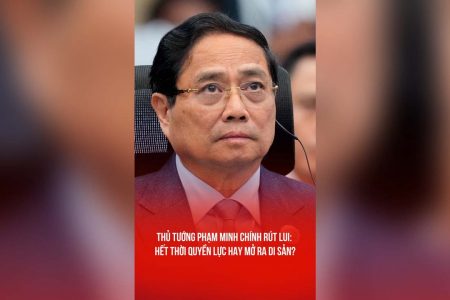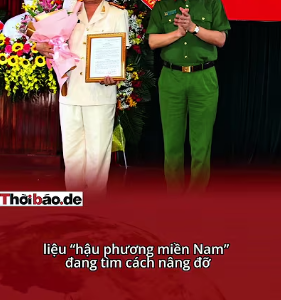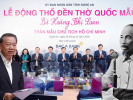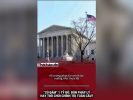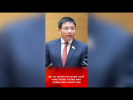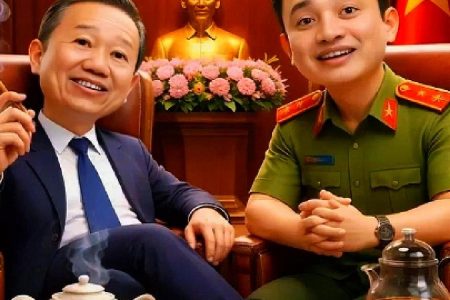
The fact that the transaction office system of Saigon Commercial Joint Stock Bank (SCB) fell into a frozen state is a consequence of the Van Thinh Phat case, related to the Ministry of Public Security’s prosecution and arrest of Truong My Lan – Chairwoman of the Board of Directors of Van Thinh Phat Group, and also owner of SCB Bank.
The arrest of the leaders of Van Thinh Phat Group has led to a wave of people coming to demand their savings at SCB transaction branches nationwide. According to the Ministry of Public Security, this has caused insecurity and social order and safety.
According to the investigation conclusions of the Police Department for Investigation of Economic Crimes, Corruption and Smuggling (C03), Ministry of Public Security, before 2011, Truong My Lan, although not holding a management position, had manipulated all operations at SCB Bank.
The Ministry of Public Security also said that Van Thinh Phat Group defrauded VND30 triillion from 42,000 investors, essentially savings deposit customers at SCB, through fraudulent bond issuance.
Truong My Lan used SCB Bank to mobilize capital from people and business organizations. By creating fake loan documents, she appropriated up to 93% of SCB Bank’s loan amount.
According to the Investigation Agency, only from February 2018 to October 2022, Truong My Lan directed her subordinates to create false 916 SCB loan applications, appropriating more than VND300 trillion. She was also accused of causing loss of interest, nearly VND130 trillion.
Accordingly, the scandal of Van Thinh Phat and SCB Bank, with losses amounting to tens of billions of dollars, has revealed to the people that the management agencies of the State of Vietnam are extremely irresponsible. Unexpectedly, it was not just the inspection agency that received bribes from SCB Bank.
That situation reflects the fragility of the Vietnamese banking system. This system has shown its vulnerability in the face of massive withdrawals of money from customers and investors from SCB Bank, after Truong My Lan and her accomplices were prosecuted and arrested.
According to analysts, Truong My Lan’s trick of withdrawing money from SCB Bank to spend for her own purposes is nothing special or new. This is exactly the same as what she did before, for 3 small banks owned by her. These three small banks, De Nhat Bank, Vietnam Tin Nghia Bank and Saigon Bank, became one large bank with the transaction name Saigon Commercial Joint Stock Bank (SCB).
More surprisingly, Truong My Lan’s tricks were similar to those of the owner of Thanh Huong perfume company in the 1980s, used to lure depositors. Something that now, looking back, many people are startled by.
Vietnam has a strict, layered supervision system of dozens of state management agencies, as well as the State Bank of Vietnam, especially the Economic Security system, which is considered the strongest in the Asian region. So why they let Truong My Lan and her ecosystem of more than 1,000 companies, mostly ghost companies, run rampant like no one else?
This (intentional) loophole created conditions for Lan to embezzle up to $12.53 billion from Saigon Commercial Bank (SCB), which she secretly controlled. That is not to mention the amount of VND30 trillion, equivalent to $1.24 billion, related to fraudulent bond issuance. The total damage is approximately 3.2% of Vietnam’s gross domestic product (GDP).
South China Morning Post newspaper, recently, in an analysis titled „Van Thinh Phat–SCB–Truong My Lan case: Corruption, poor economic management will hinder growth of Vietnam“ asked the question „Why, there are still so many outstanding things that have not been clarified in the case [of Truong My Lan], that the Vietnamese leadership stopped the investigation there?“
In just a few years, Truong My Lan has owned some of the most valuable real estate in the center of Saigon, right on Nguyen Hue Avenue, one of the most expensive streets in Asia. But those are just small assets in the „collection“ of real estate and land plots known as „gold“ or „diamond“ positions in Ho Chi Minh City.
According to analysts, the authorities are still not ready to give answers about how Lan obtained the right to buy 156 properties, including some expensive areas in District 1, Ho Chi Minh City. All land is owned by the state, and therefore political connections are needed to purchase it. Perhaps it was Lan’s political connections that stopped the investigation.
The head of the Communist Party of Vietnam Nguyen Phu Trong confessed, „hitting a mouse but do not break the vase.“ That is his foresight, and it is to prepare for this situation.
Thoibao.de (Translated)



